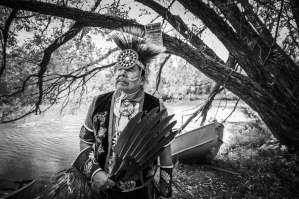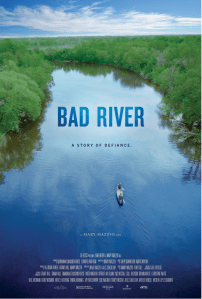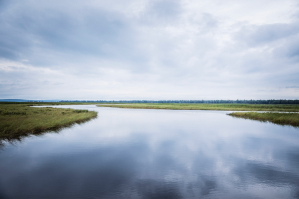EXCLUSIVE: For years the Bad River Band of Indigenous people has been fighting for the removal of an aging oil pipeline that runs through tribal land in Northern Wisconsin, warning that a rupture could prove catastrophic for Lake Superior.
Their legal battle is told in the new documentary Bad River, which opens in theaters in 11 cities on March 15. The film written and directed by Mary Mazzio is narrated by Indigenous activist and model Quannah ChasingHorse and actor Edward Norton. Producers are Mazzio, Allison Abner, and NBA Hall of Famer Grant Hill. We have your first look at the film in the trailer above.
Photo by Richard Schultz/Courtesy of 50 Eggs Films
A release about the film describes Bad River as “the inspiring David vs. Goliath story of a small indigenous community battling a large energy giant pipeline operator by filing a lawsuit for the removal of the 70-year-old pipeline that cuts through the Reservation.”
According to an Associated Press report, a federal judge last year gave Enbridge, owner of the pipeline, three years to shut down the section of its Line 5 oil and gas pipeline that runs through Reservation land. The judge also ordered the company to pay the tribe more than $5 million for trespassing on Bad River Band property.
Enbridge is appealing the judge’s order and denies it is trespassing on Bad River land. Per AP, Line 5 transports “up to 23 million gallons of oil and liquid natural gas each day, stretching 645 miles from the city of Superior, Wisconsin through northern Wisconsin and Michigan to Sarnia, Ontario.”
In a statement on its website, Enbridge says the company “remains committed to continued dialogue with Bad River leadership; however, the company has an obligation to provide uninterrupted service to its customers and is therefore moving forward with a reroute of Line 5.”
Lake Superior “holds over 10 percent of the earth’s freshwater resource,” as Michigan State University notes, hosting recreational activities as well as commercial shipping. Its Ojibwe name is Ojibwe Gichigami (“Ojibwe’s Great Sea”) or Anishinaabe Gichigami (“Anishinaabe’s Great Sea”). Any rupture of Enbridge’s Line 5 along Bad River Band territory, the filmmakers say, “would be catastrophic, not just for Bad River, but for Lake Superior herself.”

Sonny Smart on the shores of the Bad River.
Photo by Richard Schultz/Courtesy of 50 Eggs Films
The documentary goes beyond the pipeline dispute to explore the Bad River people’s broader struggle to preserve its culture and traditions. Part of the film examines Native American boarding schools (sometimes referred to as “residential schools”) that operated between the 1600s through most of the 20th century, which were designed to eradicate Indigenous culture and assimilate children into Anglo-American customs.
“They basically just grab kids and take them, take them off to these boarding schools,” one man says in the trailer. Another expert in the film comments, “They were modeled after prison systems.” Another man says, “The whole idea was, ‘Your culture is primitive.’”

50 Eggs Films
Mazzio’s credits include A Hero for Daisy, I Am Jane Doe, A Most Beautiful Thing, Ten9Eight, and Underwater Dreams. Her work “explores the concept of overcoming obstacles, whether it is a fight for social change… or issues of poverty and lack of opportunity,” a release says. “Mazzio sheds light on ordinary people doing extraordinary things – defying expectations and challenging assumptions of who and what they can achieve. Mazzio’s powerful new documentary Bad River is no exception.”
Prominent environmentalist Bill McKibben has written about the documentary, calling it “entirely unambiguous fact, not dramatized at all; if anything, some of its power comes from underplaying the tragedy it describes, that of an indigenous community forced to defend its remaining chunk of land from a heedless and rapacious oil company.”
Watch the Bad River trailer above.

